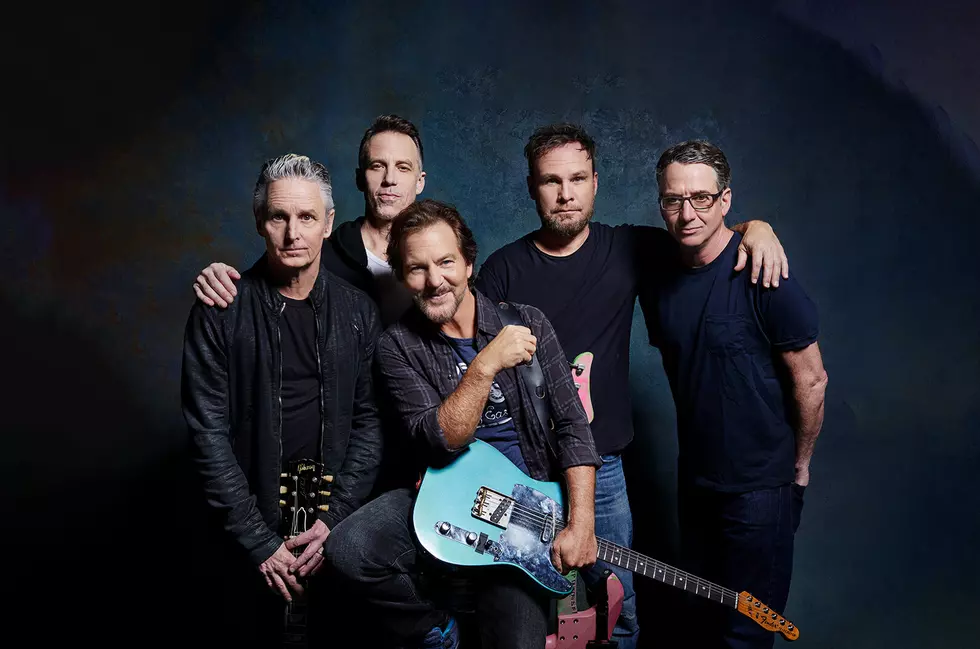
13 Years Ago: Pearl Jam Release the Artsy and Experimental ‘Riot Act’
Pearl Jam's 2002 full-length Riot Act is not an album recorded by young men looking for a riot. On the contrary, Riot Act (Pearl Jam's seventh album and their last for Epic) is the sound of a middle-aged band grappling with love, loss and mid-career doldrums.
The album opener "Can't Keep" sets the tone for the album's ruminations on death. "I want to race with the sundown / I want a last breath," Eddie Vedder sings. "I want to rise and say goodnight / Want to take a look on the other side."
But mortality wasn't limited to literary allusions to setting suns. On "Love Boat Captain," the band address the deaths of nine fans during Pearl Jam's performance at Denmark's Roskilde Music Festival in 2000. "It's an art to live with pain, mix the light into grey / Lost nine friends we'll never know, two years ago today / And if our lives became too long, would it add to our regret?"
The deaths at Roskilde and the still-fresh cultural wounds from 9/11 serve as the armature upon which the album is sculpted. After Riot Act was released, bassist Jeff Ament said, "The through line is how delicate life is. The positive part of [tragedy] is it reinforces the philosophy... that you really need to seize the moment and the day and make the most of it, and not be afraid to tell your friends and family that you love them." That's the yin to the album's tragic yang. The same song that tips its hat to the nine fans who were trampled ends with a callback to John Lennon's immortal words: "Love is all you need."
Ament is arguably the album's MVP, contributing not only the cover art and muscular bass lines (and a few subtle ones, too), but also lyrics (he's got a shared credit with Vedder on "Ghost"), music ("Ghost," "1/2 Full") and a complete song ("Help Help"). Guitarist Stone Gossard, Ament's longtime bandmate going all the way back to their days in Green River, doesn't fare as well. His "Bu$hleaguer" sports a John Trudell-like spoken word performance from Vedder and a riff right out of the "Louie Louie" playbook. The result is contrived importance that's horribly dated now that the target of the song (George W. Bush) has been out of the public eye for years.
But it wasn't all about the band's veterans. There was new blood in the Pearl Jam camp, too. Riot Act marks the band's second album with Soundgarden and Temple of the Dog drummer Matt Cameron – a musician capable of powering the band's heaviest riffs and coloring songs as delicate as "All or None," which also features a tasteful solo from guitarist Mike McCready in the tradition of "While My Guitar Gently Weeps." Cameron, who at the time referred to himself as a "fledgling songwriter," racked up three song credits on the album, including a shared credit with Vedder on "You Are." It's one of the most musically interesting tracks on the album, featuring Gossard's and McCready's guitars as force-fed through a drum machine – Cameron's idea.
The newest of the new on Riot Act, however, was keyboardist Boom Gaspar, who Vedder met in Hawaii. Gaspar (then pushing 50 years old) was a fixture on the local music scene, but he'd never heard of Pearl Jam or Eddie Vedder before. "I thought he was a swell guy," Gaspar told the Honolulu Advertiser. We kept acquainted from time to time at a surf spot and enjoyed each other's company." The pair were friends for almost a year before they connected musically. But that eventual jam session led to "Love Boat Captain" and an invitation to join Pearl Jam in Seattle.
Remarkably, for a band powered by anthemic riffs, both Gossard and McCready welcomed the addition of a keyboardist. Since teaming up with Pearl Jam, the Gaspar/McCready duel during "Crazy Mary" has become a highlight of the band's shows. Skip ahead to the four minute mark of the following clip for a taste:
But all Pearl Jam albums comes down to Eddie Vedder and Riot Act finds him in exceptional voice. He swings from classicist Pearl Jam ("Can't Keep") to wordless invocation ("Arc") to the aforementioned swing-and-a-miss spoken word effort on Bu$hleaguer." His is an admirable if uneven contribution.
But the album's weakest links are the cuts that feel like they're pandering for radio play: like the boom boom bap beat and hand clap chorus of "Get Right" or the classic-rock-by-numbers vibe of "Ghost." In all fairness, we should note that Pearl Jam released neither track as a single, choosing instead "I Am Mine" with its sea shanty waltz time and "Save You," which might be the album's heaviest track. Perhaps these aren't overtly commercial songs so much as efforts at stadium rock that simply didn't hit the mark. Regardless, Riot Act was a commercial success, racking up a gold record in the U.S. and similar distinctions throughout the world. It's by no means as essential as Ten or Vitalogy, but it's an interesting stop on the highway of the band's career.
Worst to First: Every Pearl Jam Album Ranked
More From The Moose 94.7 FM










